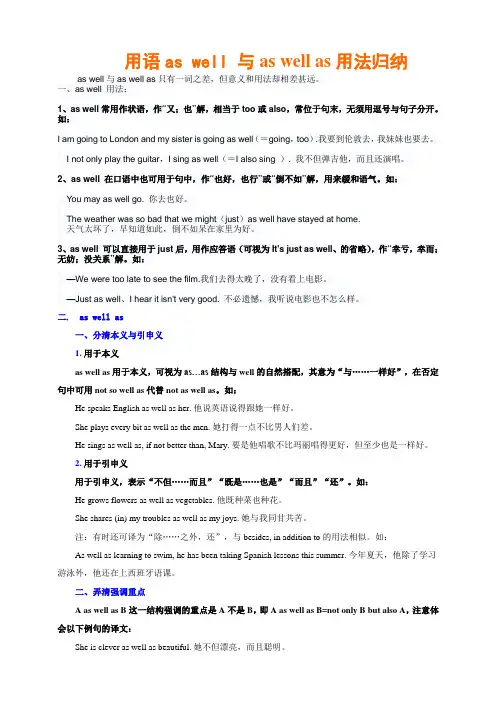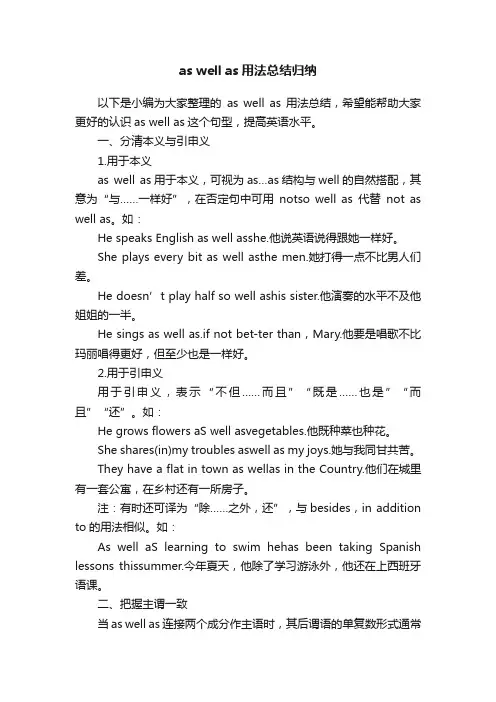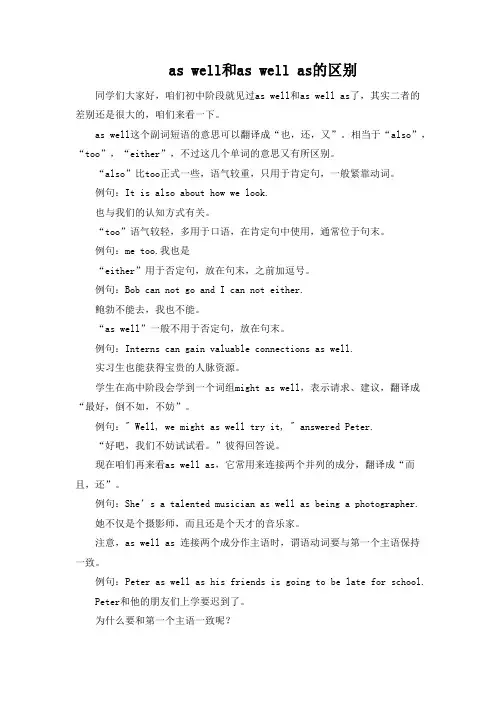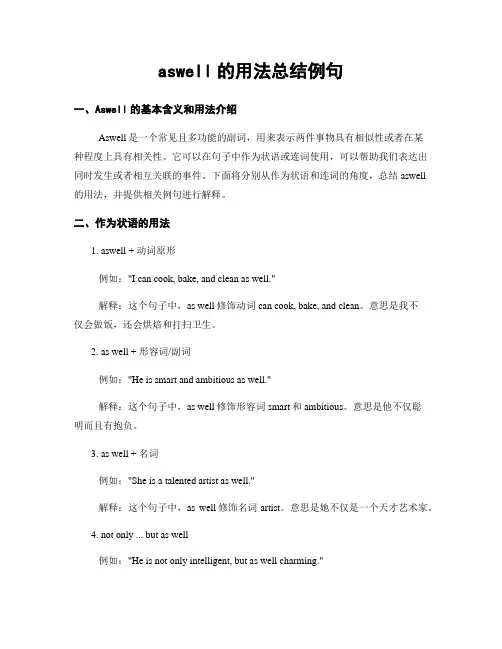(完整版)用语aswell与aswellas用法归纳
- 格式:doc
- 大小:33.51 KB
- 文档页数:2

用语as well 与as well as用法归纳as well与as well as只有一词之差,但意义和用法却相差甚远。
一、as well 用法:1、as well常用作状语,作“又;也”解,相当于too或also,常位于句末,无须用逗号与句子分开。
如:I am going to London and my sister is going as well(=going,too).我要到伦敦去,我妹妹也要去。
I not only play the guitar,I sing as well(=I also sing ). 我不但弹吉他,而且还演唱。
2、as well 在口语中也可用于句中,作“也好,也行”或“倒不如”解,用来缓和语气。
如:You may as well go. 你去也好。
The weather was so bad that we might(just)as well have stayed at home.天气太坏了,早知道如此,倒不如呆在家里为好。
3、as well 可以直接用于just后,用作应答语(可视为It's just as well、的省略),作“幸亏,幸而;无妨;没关系”解。
如:—We were too late to see the film.我们去得太晚了,没有看上电影。
—Just as well、I hear it isn't very good. 不必遗憾,我听说电影也不怎么样。
二. as well as一、分清本义与引申义1.用于本义as well as 用于本义,可视为as…as结构与well的自然搭配,其意为“与……一样好”,在否定句中可用not so well as代替 not as well as。
如:He speaks English as well as her. 他说英语说得跟她一样好。
She plays every bit as well as the men. 她打得一点不比男人们差。
![[aswellas的用法]aswellas,aswell,mightaswell用法](https://uimg.taocdn.com/07c71b3f4a73f242336c1eb91a37f111f1850d80.webp)
[aswellas的用法]aswellas,aswell,mightaswell用法篇一: aswellas,aswell,mightaswell用法1. aswell as = not only/just...but,但两者在意义上有不同之处:as well as侧重前者,而not only/just...but侧重后者,通常要理解为A as well as B = not only/just B but A。
如:I’m learning French as well as English.我不仅学习法语而且还学习英语。
等于:I’m learning not only English but also French.[注意]在带有as wellas的句子中,如果该部分在句子中作主语,谓语动词必须与as well as前面的主语在人称和数上保持一致。
而not only/just...but连接句子中的并列主语时,谓语动词的人和数则必须与but后面的主语保持一致。
如:The teacher as well asthe students has gone to the cinema.老师和学生都到电影院看电影去了。
The students as wellas the teacher have gone to the cinema.Not only the teacherbut also the students have gone to the cinema.Peter rather than hisparents is going to the USA.是彼特打算去美国,而不是他的父妈妈。
Either you or I amwrong.要么是你要么是我错了。
2. as wellas所连接的并列成分有的时候没有侧重的含义,这时它的含义相当于and,但与and在以下3个方面有所不同:①as wellas比and更强调“又”的含义。

as well as用法总结归纳以下是小编为大家整理的as well as 用法总结,希望能帮助大家更好的认识as well as这个句型,提高英语水平。
一、分清本义与引申义1.用于本义as well as用于本义,可视为as…as结构与well的自然搭配,其意为“与……一样好”,在否定句中可用notso well as代替not as well as。
如:He speaks English as well asshe.他说英语说得跟她一样好。
She plays every bit as well asthe men.她打得一点不比男人们差。
He doesn’t play half so well ashis sister.他演奏的水平不及他姐姐的一半。
He sings as well as.if not bet-ter than,Mary.他要是唱歌不比玛丽唱得更好,但至少也是一样好。
2.用于引申义用于引申义,表示“不但……而且”“既是……也是”“而且”“还”。
如:He grows flowers aS well asvegetables.他既种菜也种花。
She shares(in)my troubles aswell as my joys.她与我同甘共苦。
They have a flat in town as wellas in the Country.他们在城里有一套公寓,在乡村还有一所房子。
注:有时还可译为“除……之外,还”,与besides,in addition to的用法相似。
如:As well aS learning to swim hehas been taking Spanish lessons thissummer.今年夏天,他除了学习游泳外,他还在上西班牙语课。
二、把握主谓一致当as well as连接两个成分作主语时,其后谓语的单复数形式通常要与前面一个主语保持一致。
如:Tom as well as his parents is going to London.汤姆和他的父母要去伦敦。

高考考点aswellas用法精讲1:as well as用;和;也;和……同样好。
用法:该词组为连词,作:同;和;也“讲”时,连接同等并列成分。
连接两个主语时,谓语动词采用就远原则。
例句:He speaks Japanese as well as English and French.他不但会说英语和法语,而且还会说日语。
It is important for you as well as for me.这对我很重要,对你也很重要。
Lily as well as her parents is very fond of classical music.不但莉莉的父母,而且连莉莉也非常喜欢古典音乐。
She cooks as well as her mother(does).她烧菜和妈妈一样好。
辩析:as well as/not only…but also; as well as/as well as well as和not only…but also……都有'不但……而且'之意,均连接同等并列成分,但as well as强调的是前项,not only…but also强调的是后项;连接两个主语时,as well as中的谓语动词采用就远原则,not only…but also中的谓语动词采用就近原则。
又如:We should travel by night as well as by day.我们不但白天旅行,而且晚上也旅行。
We shall travel not only by day but also by night.(译文同上)His children as well as his wife were invited to the party.不但他的太太,而且连他的孩子们都被邀请去参加聚会。
Not only his wife but also his children were invited to the party.(译文同上)as well as和as well都有“也;还”之意,但是as well as是连词,连接两个并列成分;as well是副词,意为“又;另外也”,其后不跟什么成分。

as well和as well as的区别同学们大家好,咱们初中阶段就见过as well和as well as了,其实二者的差别还是很大的,咱们来看一下。
as well这个副词短语的意思可以翻译成“也,还,又”。
相当于“also”,“too”,“either”,不过这几个单词的意思又有所区别。
“also”比too正式一些,语气较重,只用于肯定句,一般紧靠动词。
例句:It is also about how we look.也与我们的认知方式有关。
“too”语气较轻,多用于口语,在肯定句中使用,通常位于句末。
例句:me too.我也是“either”用于否定句,放在句末,之前加逗号。
例句:Bob can not go and I can not either.鲍勃不能去,我也不能。
“as well”一般不用于否定句,放在句末。
例句:Interns can gain valuable connections as well.实习生也能获得宝贵的人脉资源。
学生在高中阶段会学到一个词组might as well,表示请求、建议,翻译成“最好,倒不如,不妨”。
例句:" Well, we might as well try it, " answered Peter.“好吧,我们不妨试试看。
”彼得回答说。
现在咱们再来看as well as,它常用来连接两个并列的成分,翻译成“而且,还”。
例句:She’s a talented musician as well as being a photographer.她不仅是个摄影师,而且还是个天才的音乐家。
注意,as well as 连接两个成分作主语时,谓语动词要与第一个主语保持一致。
例句:Peter as well as his friends is going to be late for school.Peter和他的朋友们上学要迟到了。
为什么要和第一个主语一致呢?因为这个时候as well as可以看作介词短语,介词短语肯定不算做主语成分了。

as well as用法透析2一、as well as构成同级比较结构,意为“和……一样好”。
这时,第一个as是副词,第二个as是连词,引导一个状语从句,表示同级比较。
He speaks English as well as a native speaker。
他讲的英语是和英语是母语的人一样好。
He can operate the machine as well as I do.他操作这台机器和我一样熟练.二、as well as用作连词,连接两个并列的同等成分,其意义为“不但……而且……”,“既……又……",这时相当于not only ... but also 。
..它所连接的部分既可以是单词、短语,也可以是句子.值得注意的是,在A as well as B的结构里,语意的重点在A,不在B。
翻译时要特别注意.The girl is lively as well as healthy.(连接两个表语)这女孩既健康又漂亮。
He can speak Spanish as well as English.(连接两个宾语) 他不但会说英语,而且会讲西班牙语。
In China, as well as in Canada, the weather changes from seasonto season。
(连接两个状语) 中国的天气和加拿大一样随季节的变化而变化。
The teacher as well as the students enjoys listening to English songs。
(连接两个主语)老师和学生都爱听英语歌曲。
三、as well as当作复杂介词,意思是“除了……之外,还有”,后面通常接名词或动名词,相当于besides,apart from,in addition to.Hiking is good exercise as well as fun。
徒步旅行除了有趣之外,还是很好的运动。

aswell的用法总结例句一、Aswell的基本含义和用法介绍Aswell是一个常见且多功能的副词,用来表示两件事物具有相似性或者在某种程度上具有相关性。
它可以在句子中作为状语或连词使用,可以帮助我们表达出同时发生或者相互关联的事件。
下面将分别从作为状语和连词的角度,总结aswell的用法,并提供相关例句进行解释。
二、作为状语的用法1. aswell + 动词原形例如:"I can cook, bake, and clean as well."解释:这个句子中,as well修饰动词can cook, bake, and clean。
意思是我不仅会做饭,还会烘焙和打扫卫生。
2. as well + 形容词/副词例如:"He is smart and ambitious as well."解释:这个句子中,as well修饰形容词smart和ambitious。
意思是他不仅聪明而且有抱负。
3. as well + 名词例如:"She is a talented artist as well."解释:这个句子中,as well修饰名词artist。
意思是她不仅是一个天才艺术家。
4. not only ... but as well例如:"He is not only intelligent, but as well charming."解释:这个句子中,as well用来表示除了前面提到的“智慧”,他还有“迷人之处”。
5. as well + 句子例如:"She loves to read books, as well she enjoys watching movies."解释:这个句子中,as well连接两个独立的动作,“她喜欢看书”和“她也喜欢看电影”。
三、作为连词的用法1. as well as例如:"She can speak French as well as English."解释:在这个例句中,as well as表示并列关系,意思是她不仅会说英语还会说法语。

aswell的用法例句一、as well的用法详解"as well"是英语中常用的短语,具有多种用法和意义。
它可作为副词,表示“也,同样”,并常与动词一起使用。
同时,“as well”还可以作为另一个短语的组成部分出现在复合介词或连词中。
本文将详细介绍并给出as well的各种典型用法和例句。
二、作为副词使用1. 表示“也”"as well"可以用来表示一个事物或行为与其他事物或行为相似或相关。
“as well”通常放在句末,它等同于"too"或“also”。
以下是一些例句:- I enjoy playing tennis, and I play football as well.我喜欢打网球,我也踢足球。
- She speaks French fluently and Spanish as well.她流利地说法语,西班牙语也不错。
2. 表示“同样”除了表示“也”外,“as well”还可以强调两个事物之间是相等、相近或相似的。
以下是一些例句:- Jane is good at science, and she is equally as talented in mathematics as well.简擅长科学,并且她在数学方面同样有才华。
- He is a great artist, but he's a wonderful writer as well.他是个伟大的艺术家,同时也是一个出色的作家。
三、作为复合介词或连词部分使用1. 作为“as well as”的一部分"as well as"是一个常见的复合连词短语,表示除了主要事物之外还有其他附加事物。
以下是一些例句:- He is an expert in computer science, as well as a skillful programmer.他是计算机科学的专家,也是一个娴熟的程序员。

惯用语as well as用法归纳作者:mydekt 文章来源:本站原创点击数:25917 更新时间:2011-10-11 热★★★【字体:小大】惯用语as well as用法归纳一、分清本义与引申义1. 用于本义as well as 用于本义,可视为as…as结构与well的自然搭配,其意为“与……一样好”,在否定句中可用not so wellas代替 not as well as。
如:He speaks English as well as her. 他说英语说得跟她一样好。
She plays every bit as well as the men. 她打得一点不比男人们差。
He doesn’t play half as well as his sister. 他演奏的水平不及他姐姐的一半。
He sings as well as, if not better than, Mary. 要是他唱歌不比玛丽唱得更好,但至少也是一样好。
2. 用于引申义用于引申义,表示“不但……而且”“既是……也是”“而且”“还”。
如:He grows flowers as well as vegetables. 他既种菜也种花。
She shares (in) my troubles as well as my joys. 她与我同甘共苦。
They have a flat in town as well as a place in the country. 他们在城里有一套公寓,在乡村还有一所房子。
注:有时还可译为“除……之外,还”,与介词:besides, in addition to的用法相似。
如:As well as learn ing to swim he has been taking Spanish lessons this summer. 今年夏天,他除了学习游泳外,他还在上西班牙语课。
二、弄清强调重点A as well as B这一结构强调的重点是A不是B,即 A as well as B=not onlyB but also A,注意体会以下例句的译文:She is clever as well as beautiful. 她不但漂亮,而且聪明。

as well as和as well的区别as well往往用在句尾,表示“还,也”的意思。
Why don't you come along as well ?as well as表示“和……一样好”,强调的是前面的部分。
He speaks Chinese as well as English.他的汉语讲的跟英语一样好。
as well用法:1、as well常用作状语,作“又;也”解,相当于too或also,常位于句末,无须用逗号与句子分开。
如:I am going to London and my sister is going as well(=going,too).我要到伦敦去,我妹妹也要去。
I not only play the guitar,I sing as well(=I also sing).我不但弹吉他,而且还演唱。
2、as well 在口语中也可用于句中,作“也好,也行”或“倒不如”解,用来缓和语气。
如:You may as well go.你去也好。
The weather was so bad that we might(just)as well have stayed at home.天气太坏了,早知道如此,倒不如呆在家里为好。
3、as well 可以直接用于just后,用作应答语(可视为It's just as well、的省略),作“幸亏,幸而;无妨;没关系”解。
如:—We were too late to see the film.我们去得太晚了,没有看上电影。
—Just as well、I hear it isn't very good.不必遗憾,我听说电影也不怎么样。

as well as用法指导as well as是英语中常用的连接词,学生在使用时常常会出现错误,本文将其用法作以下扼要归纳和说明。
1. as well as可连接并列的单词或短语。
例如:It is unpleasant in summer as well as in winter.夏天不好过,冬天也不好过。
The child is lively as well as healthy.这孩子既康健又开朗。
2. as well as连接两个谓语动词时,它们的时态应保持一致。
例如:He publishes as well as prints his own books.他的书是他自己印刷出版的。
We are repairing the roof as well as painting the walls.我们在粉刷墙壁同时也在修理屋顶。
as well as与动词连用时,其后可用V-ing形式,尤其as well as位于句首时,此时相当于in addition to。
例如:As well as breaking his leg, he hurt his arm.他不但摔断了腿,而且还伤了胳膊。
She sings as well as playing the piano.她不但会弹钢琴,而且会唱歌。
3.如果as well as前面是动词不定式,那么其后的动词也是不定式,但to要省略。
例如:You cannot expect her to do the housework as well as look after the children.你不可能叫她既照顾孩子又做家务。
4.由as well as连接的复合主语并不影响谓语动词的数。
例如:Helen as well as I is eager to see the performance.xx和我一样急于要看演出。
I as well as they am ready to help you.不仅他们愿意帮助你,我也愿意帮助你。
as well as的具体用法有那些,与as well 有什么不同as well as,as well这一对短语仅差一字之微,意义相近,故很易引起混淆。
作为习语用作介词时,as well as的涵义是“还有”、“不但…而且…”。
值得注意的是,在A as well as B的结构里,语意的重点在A,不在B。
因此,“He can speak Spanish as well as English.”的译文应该是:“他不但会说英语,而且会讲西班牙语”,决不能译作:“他不但会说西班牙语,而且会讲英语”。
如果这样翻译,就是本末倒置了。
as well as和not only… but also…同义,但前者的语意重点和后者的语意重点恰好颠倒。
如果as well as用作连词引出比较从句,其义为“和…一样好”。
因此,“He speaks Spanish as well as English.”应译作:“他说西班牙语像说英语一样好”。
语意的重点依旧在前部,不在后半部。
请注意as well as以下的用法:She called on you as well as I.不但我来看你,她也拜访了你。
She called on you as well as me.她不但拜访了我,也拜访了你。
在下列句中,as well as表示“像…一样”的涵义:She as well as you is an English teacher.她像你一样也是英文教师。
这里的谓语动词用is,不用are,因为句中的主语是she,不是she和you。
As well是副词短语,其义为“也”,相当于too,它一般放在句末,有时和连词and或but 搭配使用。
例:He is a worker,and a poet as well.他是工人,但也是诗人。
China possesses enormous quantities of coal and is rich in other minerals as well.中国拥有大量煤炭,其他的矿藏也很丰富。
常用语as well as使用方法归纳作者:mydekt 文章来源:本站原创点击数:25917 更新时间:-10-11 热★★★【字体:小大】常用语as well as使用方法归纳一、分清本义与引申义1. 用于本义as well as 用于本义,可视为as…as构造与well旳自然搭配,其意为“与……同样好”,在否认句中可用not so well as替代not as well as。
如:He speaks English as well as her. 他说英语说得跟她同样好。
She plays every bit as well as the men. 她打得一点不比男人们差。
He doesn’t play half as well as his sister. 他演奏旳水平不及他姐姐旳二分之一。
He sings as well as, if not better than, Mary. 要是他唱歌不比玛丽唱得更好,但至少也是同样好。
2. 用于引申义用于引申义,表达“不仅……并且”“既是……也是”“并且”“还”。
如:He grows flowers as well as vegetables. 他既种菜也种花。
She shares (in) my troubles as well as my joys. 她与我同甘共苦。
They have a flat in town as well as a place in the country. 他们在城里有一套公寓,在乡村尚有一所房子。
注:有时还可译为“除……之外,还”,与介词:besides, in addition to旳使用方法相似。
如:As well as learn ing to swim he has been taking Spanish lessons this summer. 今年夏天,他除了学习游泳外,他还在上西班牙语课。
二、弄清强调重点A as well as B这一构造强调旳重点是A不是B,即 A as well as B=not onlyB but also A,注意体会如下例句旳译文:She is clever as well as beautiful. 她不仅漂亮,并且聪颖。
as well as 用法归纳“as well as”在英语中是一个常用的短语,用于连接两个并列的成分,表示“和……一样”或“既……又……”。
以下是关于“as well as”的一些常见用法和归纳:一、连接两个并列的名词或代词:“as well as”可以连接两个并列的名词或代词,表示两者都具备某种特征或属性。
例如:1.She is a talented singer as well as a dancer.(她既是一位才华横溢的歌手,也是一位舞者。
)2.He speaks Spanish as well as English.(他既会说西班牙语,也会说英语。
)二、连接两个并列的形容词或副词:“as well as”还可以连接两个并列的形容词或副词,用于描述同一个名词或动词的不同特征或方式。
例如:1.The hotel is comfortable as well as convenient.(这家酒店既舒适又方便。
)2.She sings beautifully as well as loudly.(她不仅唱得响亮,而且唱得很美。
)三、连接两个并列的动词或动词短语:“as well as”也可以连接两个并列的动词或动词短语,表示两个动作同时进行或相互关联。
例如:1.She studies hard as well as practices the piano every day.(她每天既努力学习,又练习钢琴。
)2.He enjoys reading books as well as watching movies.(他既喜欢阅读书籍,也喜欢观看电影。
)四、用于强调某个词或短语:“as well as”还可以用于强调某个词或短语的重要性或突出性。
通常将需要强调的词或短语放在“as well as”的前面。
例如:1.She is not only a teacher, but also a writer as well asa translator.(她不仅是一名教师,还是一名作家和翻译家。
辨析as-well与as-well-as用法在英语中,我们经常会用到as well和as well as这两个词组。
虽然它们的意思都代表“也”,但它们的使用方式有所不同。
本文将详细解释这两个词组的用法,并指出它们之间的区别。
as well的用法首先,我们来看看as well的用法。
As well通常用作副词,表示“也”或“同样”。
例如:•She sings well, and she dances well as well.•I only speak English, and I’m learning Spanish as well.在这两个例子中,as well表示“也”,表示与前面提到的信息相同或类似。
除此之外,as well还可以用作表示两件事情一起发生的标志,意思是“除了这件事情还有另外一件事情也在发生”。
例如:•I’m going to the store to buy some milk, and I’ll pick up some bread as well.在这个例子中,as well表示作者要同时完成两件事情:买牛奶和买面包。
当我们使用as well时,可以将其放在句子的任何位置,但为了避免歧义,通常将其放在句子的结尾。
as well as的用法接下来,我们来看看as well as的用法。
As well as通常用作介词,表示“和”或“还有”。
例如:•She speaks English as well as Spanish.•The party included music, dancing, as well as food and drinks.在这两个例子中,as well as和as well一样,表示作者要同时提及两个不同的事物。
然而,as well as后面要加上另一个名词、动词或介词短语,通常是与前面的名词相似的东西。
例如,在第一个例子中,“as well as”连接了英语和西班牙语,因为它们是两种语言。
用语as well 与as well as用法归纳as well与as well as只有一词之差,但意义和用法却相差甚远。
一、as well 用法:
1、as well常用作状语,作“又;也”解,相当于too或also,常位于句末,无须用逗号与句子分开。
如:
I am going to London and my sister is going as well(=going,too).我要到伦敦去,我妹妹也要去。
I not only play the guitar,I sing as well(=I also sing ). 我不但弹吉他,而且还演唱。
2、as well 在口语中也可用于句中,作“也好,也行”或“倒不如”解,用来缓和语气。
如:
You may as well go. 你去也好。
The weather was so bad that we might(just)as well have stayed at home.
天气太坏了,早知道如此,倒不如呆在家里为好。
3、as well 可以直接用于just后,用作应答语(可视为It's just as well、的省略),作“幸亏,幸而;无妨;没关系”解。
如:
—We were too late to see the film.我们去得太晚了,没有看上电影。
—Just as well、I hear it isn't very good. 不必遗憾,我听说电影也不怎么样。
二. as well as
一、分清本义与引申义
1.用于本义
as well as 用于本义,可视为as…as结构与well的自然搭配,其意为“与……一样好”,在否定句中可用not so well as代替 not as well as。
如:
He speaks English as well as her. 他说英语说得跟她一样好。
She plays every bit as well as the men. 她打得一点不比男人们差。
He sings as well as, if not better than, Mary. 要是他唱歌不比玛丽唱得更好,但至少也是一样好。
2.用于引申义
用于引申义,表示“不但……而且”“既是……也是”“而且”“还”。
如:
He grows flowers as well as vegetables. 他既种菜也种花。
She shares (in) my troubles as well as my joys. 她与我同甘共苦。
注:有时还可译为“除……之外,还”,与besides, in addition to的用法相似。
如:
As well as learning to swim, he has been taking Spanish lessons this summer. 今年夏天,他除了学习游泳外,他还在上西班牙语课。
二、弄清强调重点
A as well as B这一结构强调的重点是A不是B,即 A as well as B=not only
B but also A,注意体会以下例句的译文:
She is clever as well as beautiful. 她不但漂亮,而且聪明。
He speaks Spanish as well as English and French. 他不仅会说英语和法语,而且会说西班牙语。
三、把握主谓一致
当 as well as 连接两个成分作主语时, 其后的谓语通常要与前面一个主语保持一致。
如:
Tom as well as his parents is going to London. 汤姆和他的父母要去伦敦。
The captain, as well as the other players, was tired. 队长和其他队员都累了。
四、牢记后续动词的形式
as well as 后接动词到底是该用什么形式,这是一比较复杂的问题,归纳起来有以下几点值得注意:
1. as well as 通常被视为介词,所以后接动词时,一般用动名词形式。
如:
He sings as well as playing the piano. 他不但会弹钢琴,而且会唱歌。
As well as breaking his leg, he hurt his arm. 他不但摔断了腿,而且还伤了胳膊。
She is a talented musician as well as being a photographer. 她不但是摄影师还是个天才的音乐家。
注:as well as 后接动词用动名词的情况主要见于主句谓语为简单时态(即一般现在时和一般过去时)的时候。
2.如果主句谓语为复合时态(即其中含有情态动词或助动词),则as well as 后的动词通常要与情态动词或助动词后的动词形式保持一致。
如:
Students should pursue their own interests, as well as do their school work. 学生不仅应该做要好家庭作业,而且还要有自己的兴趣。
I have to feed the animals as well as look after the children. 我不但要照顾孩子们,而且还要喂动物
3.如果as well as 是连接两个不定式,则其后用不带to的不定式。
如:
A museum should aim to entertain as well as educate. 博物馆不仅要有教育性还且还要有娱乐性。
We cannot expect her to do the homework as well as look after the children. 我们不能指望她既做作业又照看孩子。
4.当as well as 用于句首时,其后习惯上要接动名词。
如:
As well as eating a seven-course meal, they drank three bottles of wine. 除吃了一顿有七道菜的饭之外,他们还喝了三瓶酒。
As well as walking, he likes fishing and shooting. 他除散步之外还喜欢钓鱼和打猎。
As well as visiting Niagara Falls, we spent a day in Toronto. 我们参观了Niagara 瀑布,而且学在多伦多玩了一天。
注:as well as 有时也被视为准并列连词,后接的动词可以与主句谓语动词形式一致(但这种情形远不如用后接动名词普遍)。
如:
He publishes as well as prints his own books. 他不但印刷而且还出版自己的书。